What we have done in the past
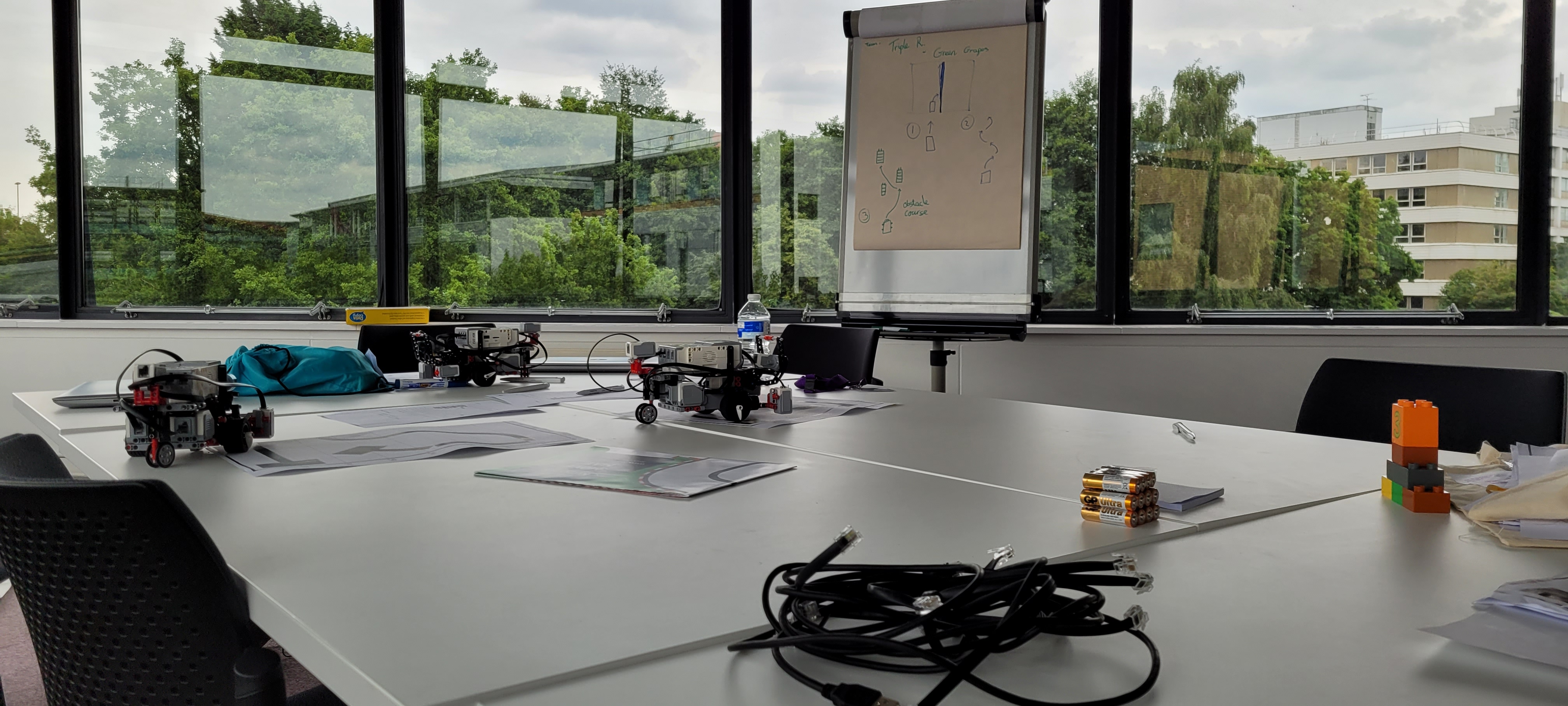
WMG Outreach
Our Past Activity
Here are some examples of projects that the WMG Outreach team has supported in the past.
2022 | 2021 | 2020 | 2019 | 2018 | 2017 | 2016 | 2015 | 2014 | 2013 | 2012 | 2011 | 2010 | 2009 | 2008
What kinds of activities do we take part in?
What is outreach?
WMG Outreach work with internal teams, local schools, national partners, and international communities to produce educational resources linked directly to the work we do in the department. Whenever we speak to an audience outside of our traditional academic colleagues, this is outreach.
What is public engagement?
It’s important to tell the story of what we do at the University and take on our role as part of the local community. It’s also important to listen to what the people around us think about our research and the impacts it could have on their lives. We might be talking to people at a stand in a shopping centre, doing a lecture in a pub, or a family fun day on campus. This is Public Engagement.
What is widening participation?
It’s also important to encourage young people to consider careers in science and engineering – technical, teaching, academic, or professional services. We need to ensure that the future workforces in these areas are diverse and are fair to access for people from all backgrounds. When we work in local areas with specific groups to support their progress through additional societal barriers into science or engineering, this is Widening Participation. It is vital that widening participation activities are high quality, inspiring, and beneficial to the students. They also have to be accessible to people regardless of their socioeconomic background, disability, or culture. We have to provide activities for all.
An event may target individual students (through recruitment) and select them based on Widening Participation criteria, which include students who:
- are the first in their family to go into Higher Education,
- are from a group that is under-represented inSTEM,
- receive, or have received, free school meals,
- are young carers,
- are living with a disability,
- are in, or have experience of care,
- are refugees,
- are from areas of low participation in Higher Education (POLARdata),etc.
Alternatively, an event may target a school that meets criteria indicative of hosting students who are from Widening Participation backgrounds, such as:
- the school is outside of mainstream education,
- the school has a percentage of students receiving Free School Meals (you can look this up here: https://www.gov.uk/school-performance-tables) higher than the national average of 23.8% (https://explore-education-statistics.service.gov.uk/find-statistics/school-pupils-and-their-characteristics),
- etc.
The WMG Outreach team works with networks of schools that have been identified as priorities for widening participation work:
- The Lord Bhattacharyya Engineering Education Programme (LBEEP) - details of the programme
- Experience Warwick - details of the programme
2022
Engineering a Sustainable Future - Summer School
Our summer schools focus on groups of students working on a project over the course of the event. Students heard from industry experts in engineering, who are shaping the future that we will all live in. Each project linked to an area of WMG research. Examples of projects developed for this summer school:
- Building a model solar cell that tracks the sun across the sky
- Building a model turbine for wind power generation
- Designing a model vehicle to overcome obstacles and terrain
- Automating battery manufacture
- Creating a model smart city
- Programming model vehicles to use sensors to drive like autonomous vehicles will in the future
The activities were created by engineers on our Graduate Scheme: Lauren Cooper, Josh Wallis, Ben Hunt, Irma Houmadi, Pete Baker, Anima Rahman, Jack Ingram, Shivam Mishra, Jordi Smith, Ali Majed, Robert Heymer, Veronika Majherova, Laura Copland, Hamid Serry, and Ben Burberry.
Annual Outreach Report
We saw 12,000 attendees at our 81 events, made in collaboration with 91 different members of staff. We also reached 142,000 views of our website. You can read our annual outreach report online.
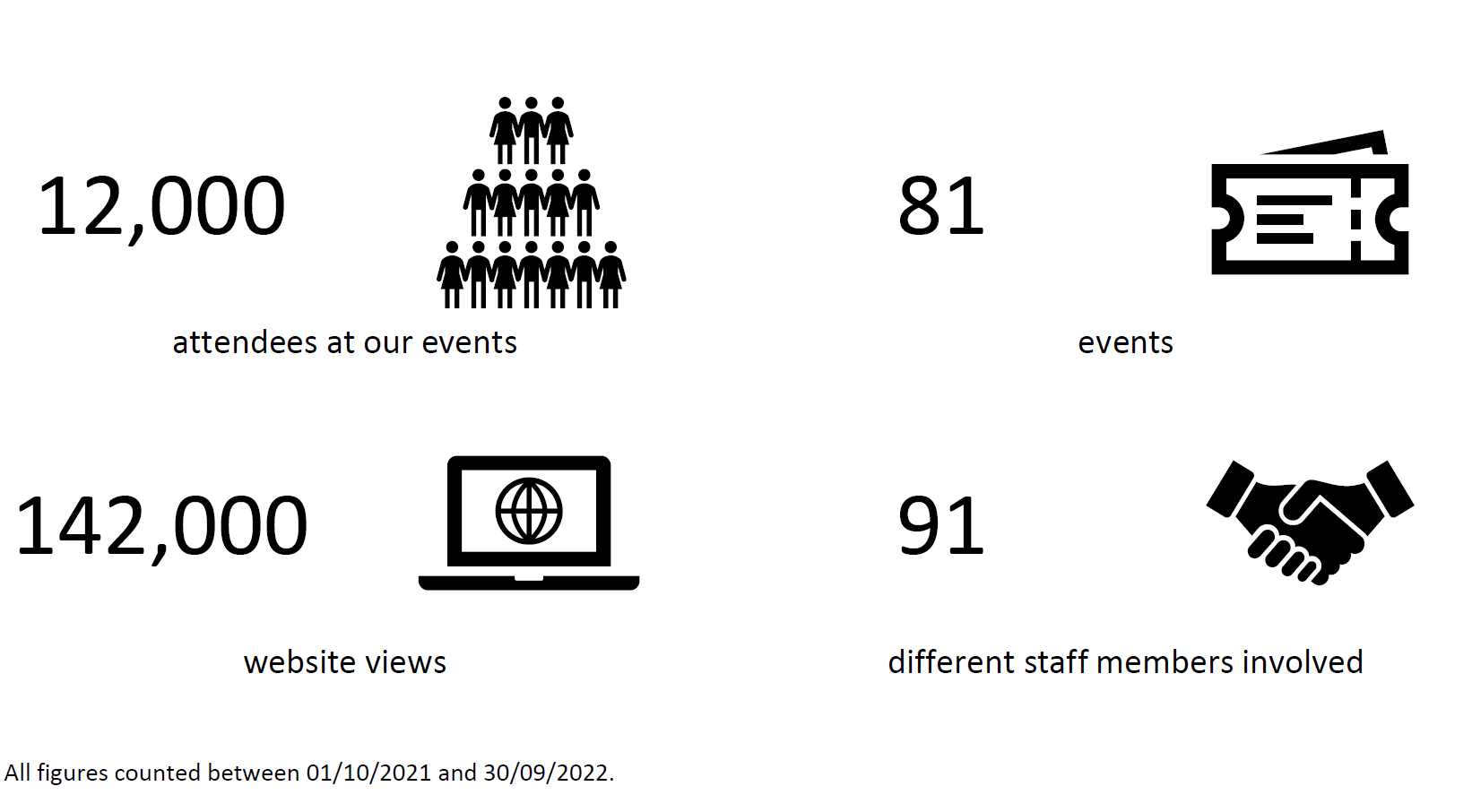
2021
Fully Electric Challenge
In partnership with the Smallpeice Trust, Lauren Cooper, Josh Wallis, Ben Hunt and Irma Houmadi of WMG's graduate scheme designed resources and ran a remote summer school for year 11 students. The project had students build a kit car, test motors, create code and engineer solutions for transport electrification. The resources can be found at https://warwick.ac.uk/fac/sci/wmg/about/outreach/resources/fullyelectricchallenge/
Annual Outreach Report
Counted between 01/10/2020 and 30/09/2021. 155,000 website views, 1,000 live event attendees and 31 live events.
The full annual report for the 2020/2021 academic year is available online by clicking hereLink opens in a new window.
2020
Royal Institution Masterclasses
This year's Ri Engineering at Warwick Masterclasses were led by:
- Software and Control: Margaret Low
- Computer Aided Design and 3D printing: Diane Burton
- The Power of Process: Mairi Macintyre
- Crash Structures from Recycled Materials: Peter Wilson
- Autonomous Vehicles - a taste of things to come: Valentina Donzella
- Material Matters: Mel Loveridge + Eve Wheeler-Jones
The activities were unfortunately disrupted by Covid-19 restrictions and remote, digital provision was introduced for the final sessions.
Passport 2 Your Future
As a remote summer school for Year 10 students, WMG created video resources featuring interviews with our engineers and a question and answer from the students. The resources can be found at the link https://warwick.ac.uk/fac/sci/wmg/about/outreach/resources/passport2yourfuture
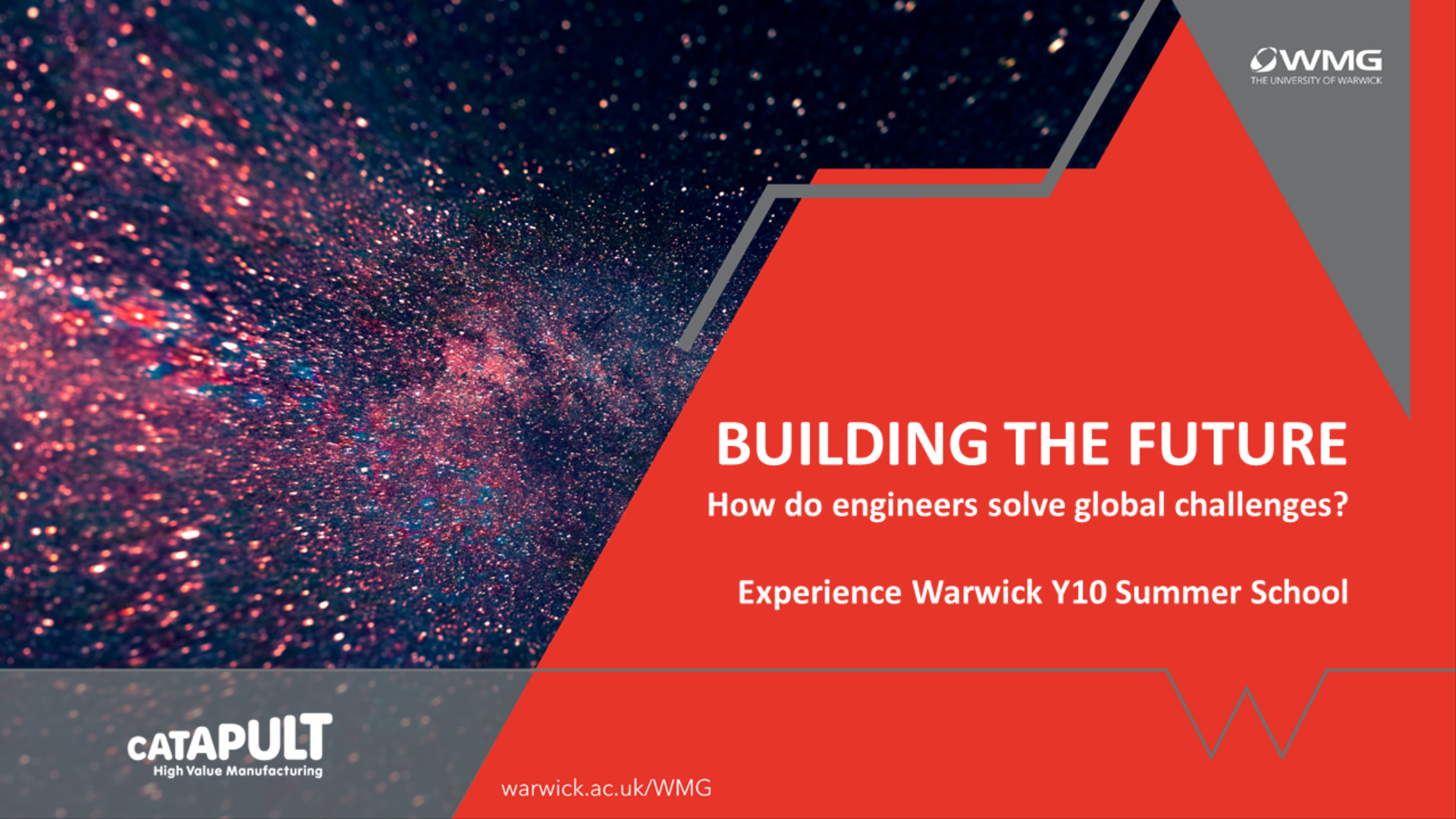
STEM Enterprise
In partnership with ThinkHigher WMG created resource boxes for students filled with components to build home made sensors (online resources for these can be found by clicking this link - build a sensor) and interviews with our engineers about how they have got into STEM careers (interview videos can be found by clicking this link - STEM Enterprise).
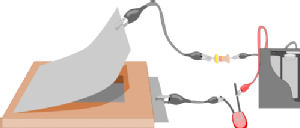
2019
Sutton Scholars
In January, as part of the Sutton Scholars project we invited a group of Year 8 students and their parents to the University. These are school students who show great academic potential, with the aim being to give them an early insight into university life by visiting campus and trying out new subjects.
As part of the visit, the Warwick Racing student project team also delivered a presentation to the group to help raise awareness of engineering and give an insight into the team’s fascinating work.
Royal Institution Masterclasses
This year is the 8th consecutive year that the Royal Institution Engineering Masterclasses have been run by WMG, University of Warwick. The masterclasses aim to raise awareness of the breadth of engineering. There are many careers open to young people in engineering, and there is a high demand for engineers in the UK. But, often children (and some adults) can have a narrow view of what engineering is with many schools not even including it in their curriculum.This year's Ri Engineering at Warwick Masterclasses were led by:
- Software and Control: Margaret Low
- Computer Aided Design and 3D printing: Diane Burton
- The Power of Process: Mairi Macintyre
- Crash Structures from Recycled Materials: Peter Wilson
- Autonomous Vehicles - a taste of things to come: Valentina Donzella
- Material Matters: Mel Loveridge + Eve Wheeler-Jones
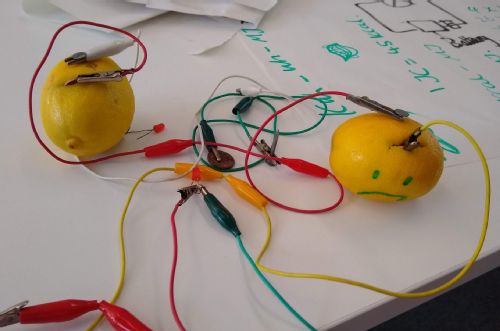
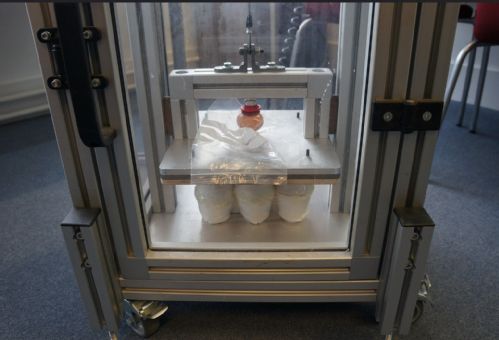
The Masterclasses are also supported by undergraduate engineering students who are employed as student ambassadors. They are an integral part of the series, providing continuity across the different masterclasses and bringing their enthusiasm and knowledge about engineering to each session.
This year’s ambassadors were Harry and Jack Adams, Tara Sharp and Adam Wickett.
Virtual masterclass
Sadly, due to Covid-19, the final masterclass – on software and control - could not be run in-person on campus. Instead it was facilitated virtually on two weekday evenings by Helen Luckhurst, Project Officer at WMG HVM Catapult, and Professor Margaret Low, Director of Outreach and Widening Participation at WMG.
This was the WMG Outreach team’s first virtual delivery of a workshop. Students built their programming and pattern design skills in the first half of the session by using a series of video tutorials, created by Helen Luckhurst. Then, they applied their skills to create an embroidered pattern design for a coaster. While using these, students asked Helen questions through an online discussion board. Helen was also able to view and test the programmes that had written on the Turtlestitch website. Margaret acted as moderator for the discussion board, checking and approving students’ posts. After running the first session, changes were made to the wording of some instructions and the discussion board layout for clarity. It was notable that students learnt from each other’s examples of how best to communicate using the online environment.
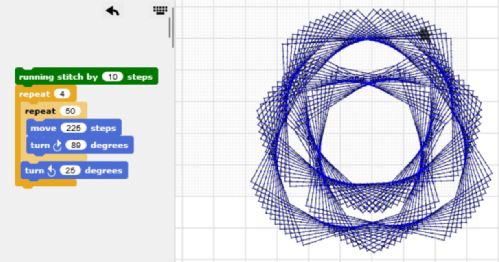 Here's some examples of a student’s work, showing the code and virtual design created during the workshop:
Here's some examples of a student’s work, showing the code and virtual design created during the workshop:
Feedback from students and parents
89% of students that participated in the virtual session enjoyed the experience and would recommend it to their friends
78% of students used positive words when asked about the virtual experience itself
"It was a great opportunity and experience for my [child] to participate in the Masterclass programme. [They] did not know what to expect but came away with an appreciation and enthusiasm for what the world of Engineering may offer in the future. Also for [them] to experience being on a university campus was a real benefit. [Their] favourite session was exploring crash structures using eggs. Thank you to WMG University of Warwick and all those involved." - parent.
"This is a great initiative." - parent.
“[My child] loved these sessions. [They] are usually not very good at sticking with things but [they]couldn't wait to attend on a Saturday morning” – parent
Feedback from student ambassadors
“Growing up I learnt about maths and science, but it would have been very beneficial to learn about how these can be applied in the real-world within engineering. I wish I could have been given an opportunity similar to this when I was at school!”
“As a student ambassador I also learn from the sessions, and my role includes helping to run the activities. This perspective gives a different insight into the subject areas, and it is always interesting to see how the Year 9 students approach the problem-solving. Their creativity can lead to some very innovative solutions!”
2018
Action Duchenne International Conference
On Friday 10 November, Diane Burton and Margaret Low ran a CAD and 3D printing workshop for teenagers attending the Action Duchenne International ConferenceLink opens in a new windowLink opens in a new window at the NEC Metropole Hotel in Birmingham.
The workshop gave teenagers attending the conference the opportunity to learn more about the potential of 3D printing to design simple gadgets to help them with every day tasks.
They learnt about 3D printing and had a chance to try Autodesk Fusion 360 CAD software. With the help of Warwick Engineering undergraduates, Harry and Jack Adams, Alice Davis and Hannah May, the youngsters used the Fusion 360 tutorials (on our outreach webpages) to learn how to design straw bungs for various drinks containers. A number of them also completed their designs during the workshop.
This workshop built on work done during the WMG project “Engaging Young People with Assistive Technology.
All the youngsters who attended received a selection of 3D printed straw bungs to take home along with details of the WMG Fusion 360 tutorials
3D Printing and CAD workshops
WMG Outreach team has been running a series of 3D printing workshops at St John’s Primary School in Kenilworth, working with year six pupils to design drip trays for ice lollies. The designs are being 3D printed and will be taken back to the school for the pupils to test. Real ice lollies, and a hair dryer to create the effect of a warm summer’s day, will be used to evaluate the performance of their designs.
Diane Burton organised the workshops along with Margaret Low, Kevin Couling, Nicole Jones, Valentina Donzella, Mairi McIntyre and Engineering Undergraduates, Hok Chui, Alice Davis, Kondkher Shabaab and Jake Saunders.

The youngsters worked in groups and used 3D printed models of popular ice lolly shapes to enable them to take measurements to develop their designs. They came up with some seriously creative designs, including drip trays to fit on the lolly stick, and drip trays with handles that the lolly stick sits inside. One design even had an angled straw hole for sucking up the tasty drips.
Your Innovative Future
Principal Engineer Siddartha Khastgir, represented WMG at the Your Innovative Future event at Solihull College attended by around 500 school students (aged 11-18) from local schools.
Siddartha took part in a special Dragon’s Den style workshop at the event on 8 March. Various businesses went head-to-head pitching sustainable initiatives and products to groups of students. The students were the ‘Dragons’ and had up to £1 million (per team) to invest in the company that they believed delivered the pitch with the most sustainable ethos.
Siddartha pitched the concept of “The Driverless Future” and won an investment worth £7 million! Other businesses pitching included Jaguar Land Rover, Network Rail and Highways England.
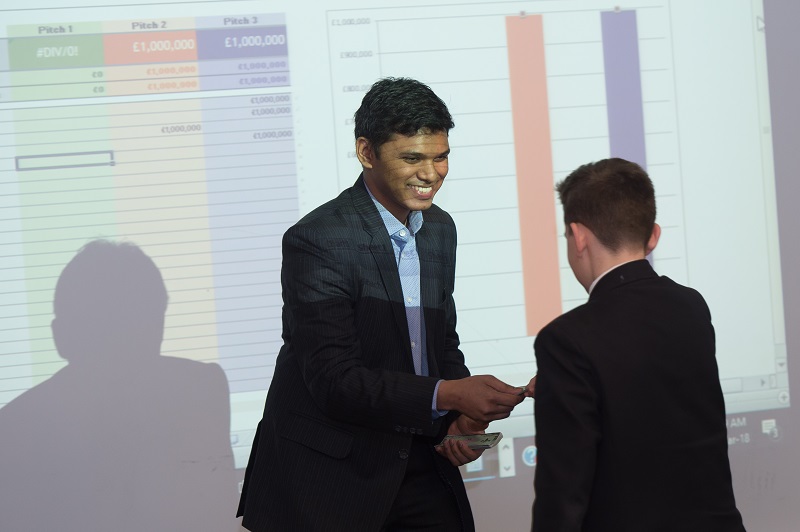
Overall, students gained a greater understanding of the benefits and challenges faced by a ‘driverless future’ and how engineering is helping to overcome these challenges.
Siddartha said: “It was a unique experience and I was intrigued by the intelligent and thoughtful questions asked by the students. The dragons gave me a hard time for the £7million!”
Royal Institution Masterclasses
Local schools were invited (by WMG and the School of Engineering) to nominate two year 9 pupils to attend the Saturday morning Royal Institution Engineering Masterclasses at WMG in the 2018 spring term.
The aim was to open the eyes of young people to the excitement, beauty and value of engineering, and in turn, inspire the next generation of scientists, mathematicians and engineers.
Each masterclass focused on an aspect of modern engineering and was presented by an engineer actively involved in research or working in industry.
These are the five sessions that were presented:
- Software and Control: Margaret Low (WMG)
- Will 3D printing turn you into a designer?: Simon Leigh (School of Engineering)
- The Power of Process: Mairi Macintyre (WMG)
- Crash Structures from Recycled Materials: Peter Wilson (WMG)
- Autonomous Vehicles - a taste of things to come: Valentina Donzella (WMG)
Aeroplanes and Rockets
Dr Antony Allen, from our Energy and Electrical Group, delivered STEM workshops for 9-11 year olds, at two Staffordshire Primary Schools in June.
Each workshop began with the children constructing paper rockets launched by air pressure by blowing through a drinking straw. They quickly realised that losing air pressure and not having a well-designed rocket are key factors hindering the ability to fly. After being introduced to the concept of forces and Newton’s three laws of motion they were able to explain this in a more technical way.
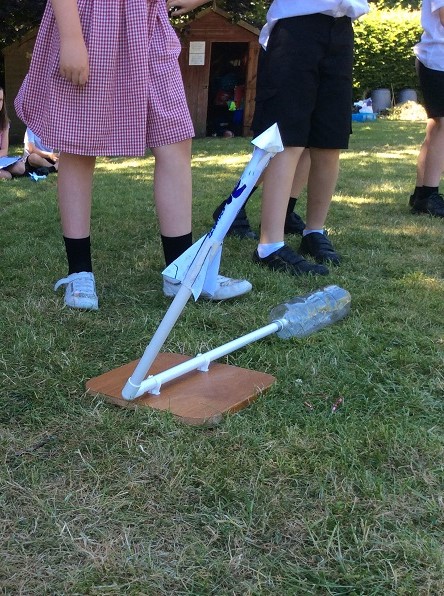
Next, the children considered the differences between rocket and aeroplane wings, before making a paper dart and experimenting with wing profiles’, they also added better propulsion by catapulting the planes using rubber bands!
In the afternoon, using their new skills, they designed and constructed a 3D paper rocket launched by air from stomping on a plastic drinks bottle. Impressively, several rockets reached heights greater than the school roof! Pupils experimented by changing the launch angle to maximise either their altitude or distance. In some cases designs were modified to balance directional disturbances and make the rockets spin during flight.
The pupils reflected on their engineering experience throughout the day and were further inspired when Dr Allen talked about Helen Sharman and how her background in science and languages were key in enabling her to become the first ever British astronaut.
The pupils loved the fun hands-on workshops, and Dr Allen has already been invited back to both schools to deliver more STEM activities.
Warwick Family Fun Day
Over the summer, our Outreach team took part in the Warwick Family Day organised by our colleagues at Warwick Arts Centre. The University hosted activities across campus and this year our team but put on a series of fun activities too.
This year’s theme was the Great Outdoors, and the children had a great time making pond slime, creating paper rockets, building Lego robots and using our virtual reality apparatus.
More than 3,500 families visited campus, and our team did a fantastic job helping to keep them all entertained. Our activities received some fantastic feedback including:
“WMG was the best bit” and “we loved the cricketers and all the stuff at WMG”.
It was a great day and we’re looking forward to playing our part again next year.
Insight Into Engineering
In June, we hosted a series of Insight into Engineering workshops for children from schools across Coventry and Warwickshire.
The children all took part in practical workshop activities including using Lego to create vehicles. Afterwards our staff, along with engineers from Jaguar Land Rover explained more about the career choices they had made and the variety of opportunities that a career in STEM can lead to. Dr Emma Rushforth also presented ‘Robots for Real’ exploring the use of robots in society.
The older children then enjoyed a tour of our engineering hall and Advanced Propulsion Centre (APC) showcase area, whilst the primary school pupils took the campus sculpture trail investigating the materials and techniques used to create them.
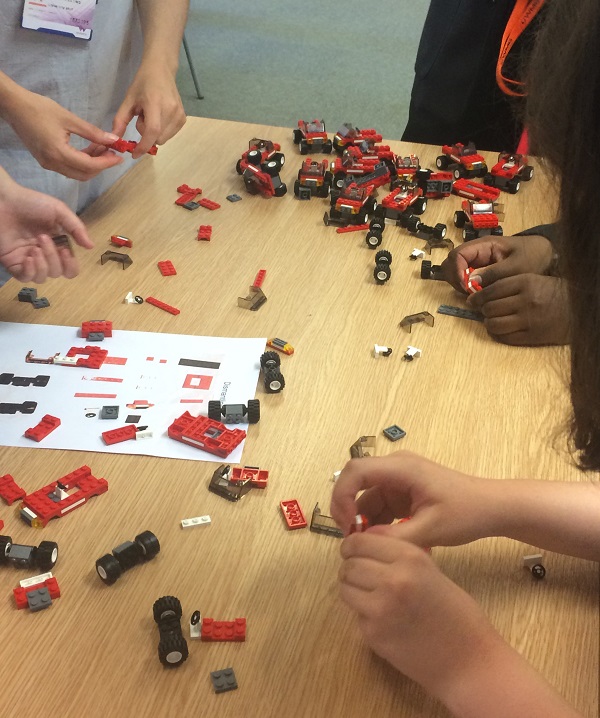
2017
Royal Institution Masterclasses
This year's Ri Engineering at Warwick Masterclasses were led by:
- Will 3D printing turn you into a designer?: Simon Leigh (School of Engineering)
- Crash Structures from Recycled Materials: Peter Wilson Felipe Cicaroni Fernandes, Paula Kishi Kurdoshi (WMG)
- Software and Control: Margaret Low (WMG)
- Material Matters: Tara Schiller, Nessa Fereshteh Saniee (WMG)
- The Power of Process: Mairi Macintyre (WMG)
- Autonomous Vehicles - a taste of htings to come: Paul Jennings, Harita Joshi, Valentina Donzella, Siddartha Khastgir (WMG)
Greenpower
We were delighted to lend our support to a team of young engineers from Howes Primary SchoolLink opens in a new window in Coventry as they embarked on the Greenpower IET Formula Goblin Project.Link opens in a new windowLink opens in a new window
Earlier in the year the children entered a competition, which involved working with engineering students from the Warwick Racing team and our technicians, to build and then race an electric kit car.
Over the past academic year the Warwick Racing team, led by Warwick Racing Outreach Manager Mankin Lee, paid regular visits to the school to help the team of seven youngsters prepare their car, which they named The Dark Knight. The children then had a chance to race against 29 other schools from across the region in a special race day in Staffordshire.
Rebecca Bollands, Deputy Head Teacher at Howes Primary said: “On behalf of Howes I would like to express our sincere thanks for giving us the opportunity to take part in the Greenpower Car Project. It is something that we have never had the opportunity to do before and it has been absolutely fantastic.
“The children have loved doing it and it has really enhanced their understanding of science and technology, in a very motivating and purposeful way. The kit car has been the talk of the school and we have it proudly positioned in our main entrance.
It will be something that our pupils will never forget and will be one of their highlights of their time at primary school. Hopefully the children involved and others will be inspired to consider jobs in engineering in the future.”
The competition was run as a pilot scheme by the Advanced Propulsion Centre (APC UK)Link opens in a new windowLink opens in a new window in conjunction with all of its ‘Spoke’ universities. The APC Spokes are a national network which brings together key areas of expertise in strategic automotive technologies. WMG, University of Warwick is the APC Spoke for Electrical Energy Storage.
The project continued for several years after this starting point thanks to WMG's Ant Allen.
WMG Academy Open Days
Our Outreach team was delighted to lend a hand at the recent open days that took place at the WMG Academy for Young Engineers in SolihullLink opens in a new windowLink opens in a new window (7th October), and CoventryLink opens in a new windowLink opens in a new window (14th October).
The event was arranged to give perspective students and their parents an insight into how the Academies run, plus a chance to see some of the STEM activities that take place.
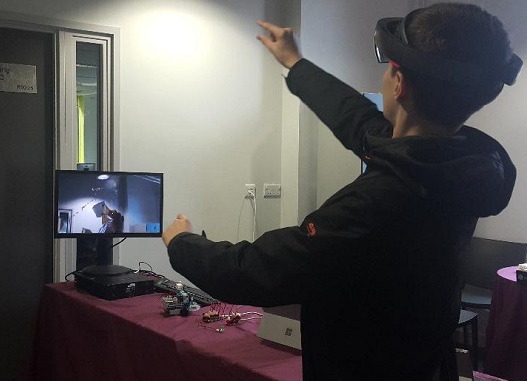
At Coventry, Senior Teaching Fellow Freeha Azmat, and Jake Tinsley from our Digital Realities team showcased HTC Vives (Virtual reality) and Microsoft HoloLens (Mixed reality). The two kits offer completely different experiences. The Vive is aimed closer towards gaming and full immersive applications. The HoloLens is aimed towards visualisation and interactions with Holograms in real world space. The teenagers also had the chance to experience our interactive games and applications such as “The Lab” for the Vive.
At Solihull, Senior Teaching Fellow Zeina Rihawi and Project Manager Maretva Baricot-Mendoza, demonstrated two different programming applications using a robot. The children were shown how several different control sensors including joysticks, touch sensors, light sensors and a potentiometer work. The sensors were then connected to the board with different LEDs (red, green, yellow), some children also expressed an interest in the ‘code’ behind the experiment.
Glenn Miles, Senior Teaching Fellow, also introduced a flat-packed go kart, as a way for students to start evolving a design from scratch. Glenn showed potential students and their families the kart and asked them what they would change about the design and why. Suggestions ranged from making bots out of metal or composites instead of the plywood, changing the drive from one-wheel to two wheel, and to making an app that would take data from sensors at the back of the car and provide a virtual instrument panel.
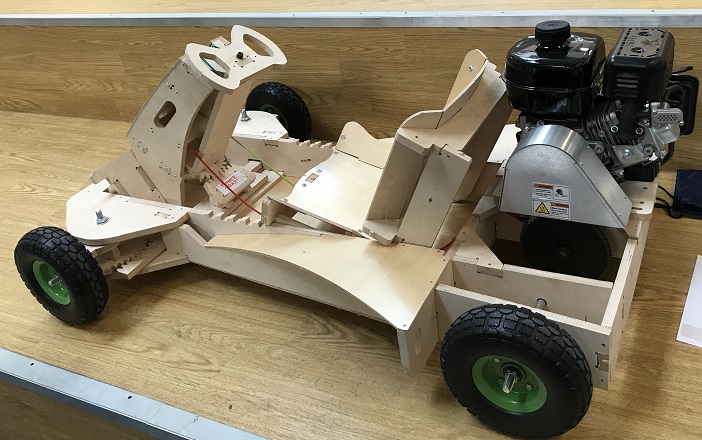
The Warwick RacingLink opens in a new windowLink opens in a new window engineering student team, led by the Outreach and Events Manager Zayn Fojdar, also joined the line-up taking with them two-stroke engines, to provide a hands on experience with prospective students assembling and disassembling them to better understand the inner workings. The Warwick students also spoke about Warwick Racing, Formula One, and engineering in general. They were also able to give some first-hand valuable engineering career advice.
ThinkHigher activity
In July, we welcomed a group of 12 and 13 year old pupils from Hartshill School in Nuneaton, as part of the Think HigherLink opens in a new windowLink opens in a new window (Coventry and Warwickshire) programme.
The children took part in a Computer Aided Design (CAD) and 3D Printing workshop, with the aim being to inspire pupils in engineering. They were shown how to use a simple CAD software package and complete a task to create their own design for an ‘ear buddy’ to store a set of headphones.
The CAD and 3D printing offered the pupils the opportunity to quickly and easily get involved in designing and making, thus building their interest and confidence. The task to design the ‘ear buddy’ was a creative task but also used planning and organisation skills to consider whether the design would actually work. The pupils sketched design ideas then took measurements of the headphones enabling them to add key dimensions to the design before using the CAD software.
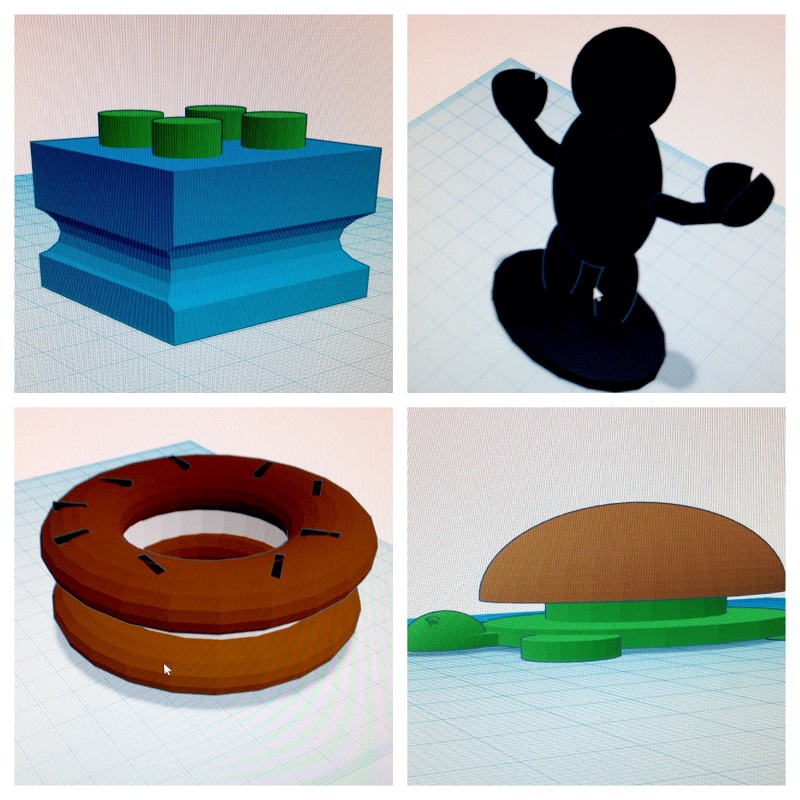
Before returning to school the students were given a tour of our Engineering Hall, with Dave Cooper and Zach Parkinson from our technical team, giving them an insight into the wider world of engineering.
The event was organised in collaboration with the Think Higher organisation. The workshop was run by Diane Burton along with Maretva Baricot-Mendoza and Warwick Engineering undergraduate Becky Crabbe.
ICERI 2017
We are delighted to be able to share the Sensing Our World workshpo at ICERI 2017. Below are links to key resources for the workshop.
The Scratch language and community home: scratch.mit.eduLink opens in a new windowLink opens in a new window
During the workshop we'll be using Picoboards to explore the creation of alternative user interfaces. The picoboard works best using Scratch 2.0 offline version, which can be downloaded here: http://scratch.mit.edu/downloadLink opens in a new windowLink opens in a new window
To connect a picoboard, you will need to download and install drivers: https://scratch.mit.edu/info/ext_download/Link opens in a new windowLink opens in a new window
Scratch CardsLink opens in a new windowLink opens in a new window
Sensing Our World WorksheetsLink opens in a new windowLink opens in a new window
ScratchEd Link opens in a new windowLink opens in a new windowEducators Website
Imagineering
The Outreach team worked with colleagues from across the University to showcase a series of fascinating engineering projects at the Imagineering Fair in Coventry.
These included Warwick Mobile Robotics and the two rescue robots, the Warwick Sub team with their human powered submarine, and Engineering Without Borders’ human powered smoothie-maker.
The event is aimed at inspiring young engineers. Visitors learn about the importance of modern engineering in everyday life and have the opportunity to meet successful real-life young engineers.
Boat-making Workshop
On Wednesday 15th February, Dr Antony Allen and Dr Juliette Soulard ran a special STEM fan-propelled boat making day at Richard Crosse Primary School in Staffordshire.
Thirty pupils from year 5 and 6 began by defining the mandatory boat requirements, sketching designs and making card prototypes. A risk assessment was undertaken and then a special floatation exercise. After morning break the children assembled their circuits, making sure to give the electrons some work to do in the motor and avoid a short circuit. The morning session was completed by cutting out the boat parts from polystyrene sheets and assembling them at the hot melt glue gun station. Well done Mr Davies for managing the orderly sharing of half a dozen hot melt glue guns between 30 children!
After a well-deserved lunch it was time to fill up a couple of paddling pools and perform a trial sail. None sank, all carried their pine-cone “Captain Dojo” passenger and, after considering the fan direction and blade profiles, all boats went forward too!
Pupils wrapped up the afternoon by critiquing their designs and reflecting on learning throughout the day. Afterwards, Juliette and Antony were put under intense interrogation, with the pupils asking probing questions on their engineering careers, electric smart cars, record breaking trains and the potential for solar powered flight.
A few days later some of the pupils then, much to the delight of their friends, showed off their creations in a boat race demo at a whole school assembly.
Materials for the boats were provided by the Institute of Mechanical Engineering, and the day was deemed so successful that we have been invited to run two similar sessions at partner schools.
2016
Royal Institution Masterclasses
This year's Ri Engineering Masterclasses at Warwick were led by:
- Crash Structures from Recycled Materials: Ben Wood (WMG)
- Crystal Structures: Shaheen Charlwood (WMG)
- Will 3D printing turn you into a designer?: Simon Leigh (School of Engineering)
- Intelligent Vehicles, a taste of things to come: Mark Amor-Segan, Valentina Donzella, Harita Joshi, Gunwant Dhadyalla (WMG)
- Cyber Securty: Kath Garnet, Andy Rylott (WMG)
- Coastal Engineering, dealing with waves at our coastline: Jonathan Pearson (School of Engineering)
123D Design Tutorials
Unfortunately the popular 123D Design platform released by Autodesk was withdrawn. Diane Burton had produced a range of tutorials for using 123D Design covering the products in the Assistive Technology project with Hereward College (you can find out more by clicking this link). 24 tutorial pages existed with videos and a written guide for each. A new set of tutorials for Fusion 360 are available on the WMG Outreach Resources webpage (you can visit this page by clicking this link).
Mozfest
At Mozfest 2016, with the help of the Technology Volunteers, the WMG team ran a Tiles for Tales workshop within the Youth Zone
The Tiles for Tales project links the craft of story telling with collaborative physical computing activities providing a simple introduction to circuits and control in a creative setting. Participants created tiles from felt, cardboard, LEDs and a Wi-Fi control board. Each tile represents a character or scene and can then be programmed using Scratch to activate the LEDs.
Scratching the surface
In August (2016), Margaret Low, along with students from Technology Volunteers and collaborators, presented their outreach activities at the Scratch@MIT event at the MIT Media Lab in Cambridge, USA.
The Technology Volunteers ran a special Science from Scratch workshop using a series of worksheets developed by the team. The workshop linked physical computing activities to a number of scientific experiments.
At the conference, the Technology Volunteers shared their new interactive circuit board, ExperiSense. ExperiSense was designed and built as a low cost interface between Scratch and Arduino with enhanced sensing capabilities. Former University of Warwick student, Stephen Pithouse designed the board while other members of the team built the interface to Scratch and Arduino. This board generated a great deal of interest with participants able to see first-hand it’s capabilities, and the team received many requests to purchase one for use in schools.
During the poster session, Margaret Low also shared the results of the Tiles for Tales project in which groups of children created an interactive 'tile' controlled wirelessly. Through Scratch multiple tiles can be created and controlled at the same time, making it an unusual and interactive group project. Tiles for Tales gives an introduction to creating circuits without the need for soldering, or the use of breadboards, and uses inexpensive materials only.
The conference was a valuable opportunity to share experiences and to see how others teach Scratch and physical computing activities. It also gave the WMG team an insight into how young children learn.
Finally, it was also an opportunity to reflect on the life of Professor Seymour Papert, who passed away in July 2016. His insightful research into the use of technology for creative learning laid the foundations for learning through play, and he is widely recognised as the father of Logo and the grandfather of Scratch.
Scratch Day 2016
In May 2016, Margaret Low and the Technology Volunteers organised a special ‘Sensing Our World’ event in Coventry Fablab, Coventry City Arcade to celebrate International Scratch Day.
At the event families were given a fun introduction to software development and unusual interfaces using Scratch. There was also the opportunity to share creations with fellow coders.
Scratch Day is a global network of events that celebrate ‘Scratch’ computer programming, and the young people who use it to code and create. During Scratch Day, people gather to share projects, and this year more than 650 communities across the world took part.
Catastrophic Failure
In December 2015, Warwick Arts Centre Link opens in a new window hosted six nights of fantastic new ideas, explosions, experiments and answers to questions taxing the University of Warwick’s finest minds, with WMG’s Dr Steve Maggs taking a starring role, assisted by Shaheen Charlwood.
Link opens in a new window hosted six nights of fantastic new ideas, explosions, experiments and answers to questions taxing the University of Warwick’s finest minds, with WMG’s Dr Steve Maggs taking a starring role, assisted by Shaheen Charlwood.
Dr Maggs presented ‘Catastrophic Failure,’ an exploration of science behind materials and their mechanical properties, looking at why different materials behave in different ways.
In the lecture, Dr Maggs explained how, in his part-time role as Chief Material Scientist at Santa's Magical Research Laboratory in Lapland, he was working on a new lightweight low carbon sledge for Santa! Dr Maggs and Shaheen demonstrated material properties such as strength, stiffness, hardness and toughness with a series of demonstrations. Dr Maggs then explained material failure and how a misunderstanding of properties was responsible for the Titanic disaster. He demonstrated how steels can suddenly go brittle when cold by using a Charpy impact testing machine. He then went on to show how knowledge of failure can be used in a positive way by opening a bottle and a can of beer on stage. He also showed how this is used to save lives in racing cars and road cars, and finally Dr Maggs explained how this knowledge was used in the new Santa sledge prototype too.
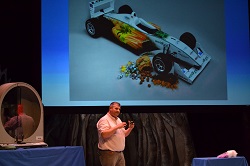
Each of the lectures attracted around 400 people and, after 'Catastrophic Failure,' Neale Grant and Philip Sellars from the Sustainable Materials Group entertained guests in the Arts Centre foyer with the 'egg drop tower'. This was the first outing for this new piece of outreach equipment (funded by the Manufacturing GRP fund which is managed by Kerry Kirwan) and based on Ben Wood's highly successful Royal Academy of Engineering masterclasses. The new kit, designed and built by WMG technicians including Dave Cooper and Carl Lobjoit, can easily be transported to schools and events for outreach work. The kit demonstrates material properties and engineering trade offs between cost, weight and environmental impact, by using different type of waste materials to build crash structures to protect a dropped egg.
2015
Royal Institution Masterclasses
This year's Ri Engineering Masterclasses at Warwick were led by:
- Software and control: Margaret Low (WMG)
- Intelligent Vehicles: Mark Amor-Segan, Ali Ahmad, Harita Joshi (WMG)
- Will 3D printing turn you into a designer?: Dr Simon Leigh (School of Engineering)
- Experiential Engineering: Dr Jamie Mackrill (WMG)
- Coastal Engineering: Dealing with waves at our coastline - Dr Jonathan Pearson (School of Engineering)
- The Power of Process: Mairi Macintyre (WMG)
Cheltenham Science Festival
WMG staff worked alongside colleagues from the School of Engineering to take part in the Science Festival. The team ran a number of events in the special Warwick ‘What If? Marquee, including hands on activities, meet the expert sessions and special school workshops on a variety of topics.
Experts from the Experiential Engineering team delivered a hands-on exploration of “The Power the Sun can Provide” and The Cyber Security team presented a series of special seminars including ‘What If…Robots are our Future Team.”
There was also a range of 3D printing activities and a rescue robot demonstration.
Maths and Beyond
‘Maths and Beyond’ is a Maths Inspiration day held annually in March at the University of Warwick.
The aim of the event is to inspire school students from Years 10, 11 & 12 to continue their study of Maths, Science and Engineering and to show the interesting ways that the subjects apply to the real world.
The day is split between a talk from a Keynote speaker and practical workshops that get the students involved.
This year the Keynote speaker for the afternoon was Coralie Kelly who discussed the 'bad maths' that has been used in courtrooms resulting in innocent people getting locked up!
The morning contained workshops on various interesting applications of maths, one of which was presented by Shaheen Charlwood (WMG) on ‘The Crystal Structure of Metals’. The Year 10 and 11 students enjoyed using marshmallows and cocktail sticks to create their own unit cells
Engaging Young Learners in CAD and 3D Printing
In 2015 and 2016, WMG and the School of Engineering ran a project which aimed to share the University’s expertise in Computer Aided Design (CAD) and 3D printing with local young people aged 11-14 to help them and their teachers, learn about design software and how to use it effectively for 3D Printing.
This project built on the work of the University of Warwick project Engaging Young People with Assistive Technologies, which worked with young people with disabilities to explore how CAD and 3D printing could help them.
The project work has continued as part of the University's STEM outreach programme with many CAD and 3D printing workshops for school pupils taking place each year both at the University and in schools.
During the project, the school pupils learned to use a free download CAD software called Autodesk 123D Design. A range of tutorials were developed for this purpose, using an approach of learning CAD by actually designing and 3D printing a range of products of increasing complexity to gradually build skills in an engaging context. The tutorials have been freely available here Link opens in a new windowand have been extremely popular.
In April 2017, Autodesk withdrew 123D Design. Our 123D tutorials are still available for use Link opens in a new windowfor those who already have the software. However, Autodesk Fusion 360, a much more powerful professional CAD package, can be downloaded free of charge by students, educators and start-ups/enthusiasts. For younger pupils, Autodesk Tinkercad is ideal and is available free to use in a web browser (Chrome or Edge work best).
WMG Outreach now has a range of beginner tutorials for Fusion 360 hereLink opens in a new window and more tutorials will be added over time. For those who have previously used the 123D Design tutorials, you will see that a number of the Fusion tutorials are for the same products, to help you compare the 123D method to the Fusion method. More Teacher Notes and ideas for use of Fusion 360 will be added in due course, particular to help with the new UK Design & Technology school curriculum/coursework.
2014
Scratch@MIT 2014
The University of Warwick Technology Volunteers attended the international Scratch@MIT conference
attended the international Scratch@MIT conference in August 2014. The three-day conference explores the creative ways that people around the world are programming and learning with Scratch - a free programming language developed by MIT aimed at introducing young people to the world of coding and programming. The Warwick team submitted three proposals for presentation at the conference, all of which were accepted and well received with attendees.
in August 2014. The three-day conference explores the creative ways that people around the world are programming and learning with Scratch - a free programming language developed by MIT aimed at introducing young people to the world of coding and programming. The Warwick team submitted three proposals for presentation at the conference, all of which were accepted and well received with attendees.
By attending Scratch@ MIT 2014, the Warwick team aimed to share their ideas and resources, developed for use with young people in the Coventry and Warwickshire area, and to interact with the international Scratch community. The team developed three activities for the conference:
- Sensing Me! Workshop Session
- Controlling our World Poster Presentation
- 'What we learned whilst teaching Scratch' Ignite Presentation
Royal Institution Masterclasses
This year's Ri Engineering Masterclasses at Warwick were led by:
- 25th January: Making an impact with recycling! - Dr Ben Wood (WMG)
- 1st February: Software and control: Margaret Low (WMG)
- 8th February: Will 3D printing turn you into a designer? Dr Simon Leigh (School of Engineering)
- 1st March: Intelligent Vehicles: Mark Amor-Segan, Anmoal Thethi, Ali Ahmad, Harita Joshi (WMG)
- 8th March: Coastal Engineering: Dealing with waves at our coastline - Dr Jonathan Pearson (School of Engineering)
- 15th March: The Power of Process: Mairi Macintyre (WMG)
Mozilla Festival
In October, the Warwick Technology Volunteers ran a workshop at Mozilla Festival 2014. MozFest is a hands-on festival dedicated to forging the future of an open online community. The festival is packed with passionate technologists and creators eager to share their skills, ideas, demos and hacks - bringing pragmatic approaches to solving real problems and creating new collaborations.
The Technology Volunteers delivered a 'Sensing our World' workshop to introduce volunteers, educators and students to the MIT Scratch programming language and demonstrating how sensors can be used to interface with the world. It was a great opportunity to spread the Volunteers' enthusiasm and ideas and promoting their work with young people in the local area.
The session proved incredibly popular and gave participants the opportunity to play with lots of different sensors and a Picoboard - a piece of hardware which allows Scratch projects to interact with the outside world. The session's popularity even led to it being featured as part of the BBC's blog piece about the Festival Link opens in a new window.
Link opens in a new window.
MozFest 2014 was a great success for the Technology Volunteers. Participants left with positive feedback - many of these were teachers and students who could take away their learning to directly replicate the workshop activities in their school using the free resources available online.
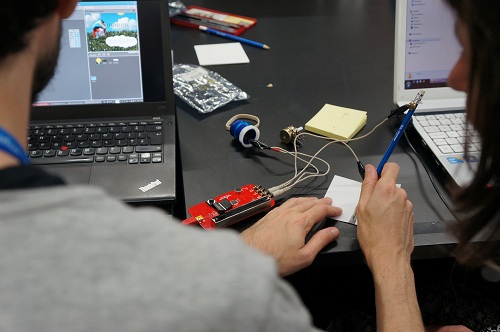
2013
Royal Institution Masterclasses
Pupils from local schools recently took part in a series of Royal Institution Engineering MasterclassesLink opens in a new window, hosted and delivered by staff and students from WMG and other Science departments at the University of Warwick. The end of the series concluded with an official presentation and awards ceremony for the children, attended by parents and teachers, to mark their participation in the series.
Twenty Year 9 students from several local schools attended the regular Saturday morning masterclasses over a period of 6 weeks. The sessions were designed to spark their interest in a wide variety of engineering paths. Topics covered over the series included programming robots, understanding waves, intelligent vehicles and 3D printing.
| At the awards ceremony Diane Crann from the Royal Institution gave a brief presentation of the aims of the masterclasses, and Bob Shanks, Chairman of the Imagineering Foundation spoke about the role of engineering in society. Bob then awarded students their certificates. |
Engineering Masterclasses were recently initiated by the Royal Institution in order to introduce Year 9 pupils to engineering through practical hands-on experience alongside practising engineers. Through the sessions, the students are encouraged to learn about the latest engineering applications and think about the possibilities for the future.
Good feedback was received from the students who took part, which demonstrated that the programme had achieved its aims. Students particularly commented on the satisfaction of seeing the results of the hard work they put into planning tasks, the enjoyment of working together as a team and understanding the science behind the way things work.
The masterclasses:
- The Robot Garden - Dr Claire Rocks (Computer Science)
- Coastal Engineering: Dealing with waves at our coastline - Dr Jonathan Pearson (Engineering)
- The Power of Process - Mairi Macintyre (WMG)
- Intelligent Vehicles - Mark Amor-Segan, Gunwant Dhaydalla, Anmoal Thethi, Ali Ahmad (WMG)
- Will 3D printing turn you into a designer? Dr Simon Leigh (Engineering)
- Making an impact with recycling! - Dr Ben Wood, Dr James Meredith (WMG)
Mozilla Festival
In collaboration with the Technology Volunteers and Marie Low, colleagues from WMG presented a workshop at the Mozilla Festival 2013 in London (25th - 27th of October 2013). The workshop 'Connecting With Our World' was based on the Technology Volunteers outreach activities at the University of Warwick and formed part of the festival stream “Making the Web Physical”.
and Marie Low, colleagues from WMG presented a workshop at the Mozilla Festival 2013 in London (25th - 27th of October 2013). The workshop 'Connecting With Our World' was based on the Technology Volunteers outreach activities at the University of Warwick and formed part of the festival stream “Making the Web Physical”.
Workshop participants built a range of simple sensors and interfaces, developing programs to respond to events in the physical environment. Creativity and fun were key elements of the session, and towards the end of the workshop, there were demonstrations of the creations.
The aim of the Technology Volunteers outreach activities is to give young people a deeper understanding of the role of hardware and software, while having fun designing and making things. The team made contact with similarly minded people over the course of the weekend, running workshops and attending sessions, and hope to have the opportunity to work with them in the future.
Running the workshop at MozFest represented some challenges for our team. The festival sessions were run in a large shared space, the schedule was flexible and only published online just before the start of the festival. The emphasis is 'less yack more hack', and it is important that people have time to develop their work in the session. To support this focus, the team set up the workshop as a set of demonstrations and small group collaborations, ensuring people could join our session at any stage.
The Mozilla Foundation (widely known for the Firefox web browser) works to support an open and community-driven web. The annual Mozilla Festival (MozFest) is an opportunity for like minded people to gather from around the world to meet and share ideas and skills. MozFest attracts an international audience, and at this years event 1400 people attended the 3 day event.
The team from Warwick included:
- Margaret Low, WMG, University of Warwick
- Andrew Sula, Computer Science student, University of Warwick
- Thomas Preece, Maths student, University of Warwick
- Matthew Healey, Physics student, University of Warwick
- Samantha Edwards, Computer Science graduate, University of Warwick
- Marie Low, Maths and Music graduate, Royal Holloway
Big Bang Fair
On 25 June, WMG staff and students attended the Big Bang Fair West Midlands which took place at the Ricoh Arena in Coventry. The Warwick stand, sponsored by the WMG centre HVM Catapult, brought together staff and students from six departments - WMG (including the WMG Academy), School of Engineering, Life Sciences, Physics, Computer Science and Maths and students from the Human Submarine Project, Engineering Society, Engineers Without Borders and the Technology Volunteers.
2012
Computing in Schools
WMG is part of a local collaboration to improve and support the teaching of computer science in schools.
Staff from Coventry and Warwick universities, education authorities and secondary schools, along with the British Computer Society and the Institution of Engineering and Technology are working together to support computer science education.
This collaboration has led to the formation of a Coventry and Warwickshire ‘hub’ for the national Computing At School organisation (CAS), set up by a group of experts concerned about falling standards.
The key aim of CAS is to support teachers directly. One way to do this is to provide local forums where staff can share ideas, meet in a relaxed atmosphere, receive training and materials and link up with representatives from academia and industry. Each meeting aims to give teachers at least one potential lesson to use back in their classrooms.
CAS wants to see the development of better GCSEs, an increase in A-level students and a reverse in the decline in number applying to do computing at university. CAS says: “Computing is one of the most exciting subjects on Earth. Yet the current arrangements for teaching computing concepts at school leave our brightest students feeling that it is irrelevant and dull.
“Those who make careers in computing progress in spite of, not because of, their school education.” CAS wants to see the development of better GCSEs, an increase in A-level students and a reverse in the decline in number applying to do computing at university. It says: “Schools typically have at most one computing teacher, who has no colleagues and feels isolated. It is quite difficult for teachers to keep up to date. This is obviously not the teacher’s fault. Supporting, equipping and training teachers is part of the challenge.”
Technology Volunteers
Technology Volunteers, an offshoot of the successful Warwick Volunteers programme, is a group of students and staff from the University of Warwick (including WMG). The aim of the group is to encourage children to become creators rather than consumers of technology. The Volunteers offer support to local schools by assisting with technology-based projects and activities during lessons and after-school clubs.
Technology Volunteers are running workshops with schools and community groups keen to develop a deeper understanding of computer science and engineering.
At one half-term workshop at Coventry’s BBC centre, young children rubbed shoulders with pensioners as they tried their hand at creating games and animations.
Margaret Low, senior teaching fellow at WMG, said:
"It is a chance for everyone to get hooked and build up an understanding of the relationship between hardware and software.
“I became aware that children often had ideas for games, animations and interactive stories that they wished to create on a computer, but weren't able to by using the standard ICT materials they had exposure to in school. Wishing to encourage them to become creators using technology, rather than simply consumers, I investigated various software tools, including Scratch Link opens in a new window (produced by MIT).
Link opens in a new window (produced by MIT).
“Our Technology Volunteers come from many faculties – we have students of computer science, maths, physics, engineering, statistics and even Classics. We are getting access to people who wouldn’t normally choose to come to a computing class."
“The mobile phone and iPod have also allowed us a way in. People love the hi-tech gloss of their phones but actually have no idea how they work. They don’t realise that phones are fitted with sensors and get quite excited when we explain what is going on in there.
“The long term objective of the workshops is to raise the profile of engineering as a possible career by engaging school pupils in engineering problems with a discussion that sets them in the context of the professional engineering discipline.”
A £6,000 grant from the National HE Stem programme (Engineering for Society) supporting the EYE (Encouraging Young Engineers) project enabled the purchase of popular Scratch sensor boards and development of workshop resources. Technology Volunteers are supported by the university’s Warwick Volunteers, who provide a general framework, CRB clearance and safeguarding training. The volunteers also have the opportunity to become STEM (Science, Technology, Engineering and Mathematics) Ambassadors for the national organisation Stemnet.
Girl Power
Girls are finding that computing is not just for boys who love on-screen action. It offers them a chance to develop their creative talents.
Feedback from girls who have come into contact with Warwick’s Technology Volunteers (go.warwick.ac.uk/techvolunteers) has been overwhelmingly positive. The problem is getting them to classes in the first place.
Many would not consider joining an after-school computing club. But when the team went into a classroom to teach a mixed group in the school day, they found the girls engaged just as well as the boys.
While the boys enjoyed using technology for chasing and shooting, the girls spent a great deal of time on the look and feel of their creations.
In another venture, the volunteers organised a workshop for the 7th Coventry Girls’ Brigade at the Holyhead Road United Reformed Church. The girls were so enthusiastic that they entered two teams for the BCS Challenge IT 2012 contest. One designed an app called Celebrity Takeover, where players lived the virtual life of a celebrity. The other created an app called House in Your Hands, by which people could control different functions in a home, such as lighting, the TV and even the bath!
Their exhibition stands, complete with fairy lights and Barbie dolls, was one of the star attractions of the finals exhibition event.
The girls said: “Our favourite thing was sharing our ideas with others – even though we were nervous of the judges at first! It was a great learning experience and we liked working in the different teams with people we don’t normally work with.”
Challenge IT competition
Young people in local secondary schools have a chance to demonstrate their computing skills in a competition for schools and youth groups supported by WMG.
Categories in the Challenge IT 2012 event include web design, mobile phone app development and digital animation.
Spearheading the idea is the Coventry branch of the British Computer Society Link opens in a new window, supported by a range of sponsors including Warwick’s Computer Science Department.
Link opens in a new window, supported by a range of sponsors including Warwick’s Computer Science Department.
The aim is to encourage interest in IT and help pupils develop awareness of good practice and a range of skills including team working and project planning, and to promote links between local schools, industry and higher education.
Margaret Low, senior teaching fellow at WMG, said:
“The competition provides a focus for young people to work together and show their creative and innovative applications. In order that students can learn from each other we round off the competition with an exhibition and prize-giving ceremony where there is a real buzz.”
2011
Student Project Teams
Formula Student Team
At Warwick, the Formula Student project runs as a 4th year group project for Engineering students. The group typically has between 12 to 15 students taking part, drawn from all of our engineering degrees.
The team takes part in the annual Formula Student competition - Europe's most established educational motorsport competition, run by the Institution of Mechanical Engineers (IMechE). Backed by industry and high profile engineers such as Ross Brawn OBE, the competition aims to inspire and develop enterprising and innovative young engineers. Universities from across the globe are challenged to design and build a single-seat racing car in order to compete in different events, which demonstrate their understanding and test the performance of the vehicle. In addition to technical skills, students acquire valuable management, marketing and people skills.
competition - Europe's most established educational motorsport competition, run by the Institution of Mechanical Engineers (IMechE). Backed by industry and high profile engineers such as Ross Brawn OBE, the competition aims to inspire and develop enterprising and innovative young engineers. Universities from across the globe are challenged to design and build a single-seat racing car in order to compete in different events, which demonstrate their understanding and test the performance of the vehicle. In addition to technical skills, students acquire valuable management, marketing and people skills.
Warwick's team has faired well at the competition over the years with our 2010 team being placed 7th in the UK. An important element of the team's development is using their project to inspire others. Our recent teams have given presentations on their achievements and visited local schools with their completed race car to discuss the project and let the children experience it close-up.
Warwick Racing and Warwick Mobile Robotics team
Each year, a team of undergraduates develop a robotic rescue platform for navigating a simulated collapsed building, locating and helping victims, both autonomously and using tele-operation.
The team and their robot complete their project by competing in the European RoboCup Rescue Championship in Germany. At the competition, the tele-operated robot has to navigate through a simulated earthquake disaster area, searching, locating and assisting victims who are trapped. The robot uses a series of human detection devices, including web-camera, CO2 sensor and infra-red camera to search for survivors.
The goal of the competition is to increase awareness of the challenges involved in search and rescue applications, provide objective evaluation of robotic implementations in representative environments, and promote collaboration between researchers. It requires robots to demonstrate their capabilities in mobility, sensory perception, planning, mapping, and practical operator interfaces, while searching for simulated victims in unstructured environments.
The Warwick team has enjoyed a great deal of success over recent years, with our 2010 team obtaining first place overall in the competition and our 2011 team being awarded the Best in Mobility Class award, as well as a lot of publicity for their novel XBox Kinect design.
In 2011, the team exhibited their Rescue Robot project at the Gadget Show Live exhibition at the NEC in Birmingham. The event increased the awareness of young people and their parents of the sorts of exciting projects our students get involved in and how these translate into real life situations in the world.
2008
Imagineering
WMG regularly participated in the Midlands Imagineering FairLink opens in a new window from 2008 through to 2016. This event provided a great opportunity to promote engineering to young people and their parents, raise awareness of the University, WMG, and the School of Engineering. The event was packed with scores of hands-on engineering and technology activities for youngsters and was supported by some of the UK's top manufacturing companies, including Jaguar Land Rover, National Grid, Caterpillar, JCB and Delcam.
WMG staff and students demonstrated a range of our research, including rapid prototyping, robotics and student racing projects such as Formula Student and evGP.
